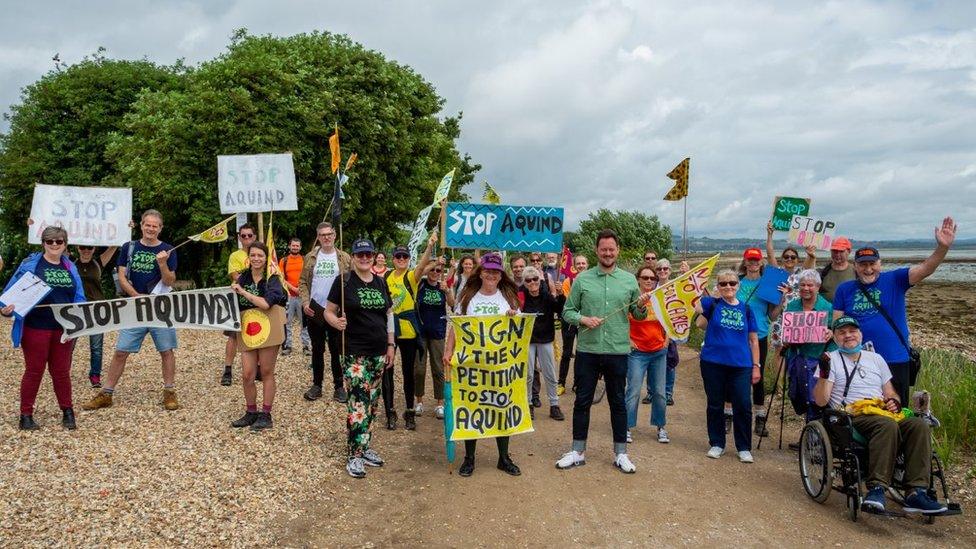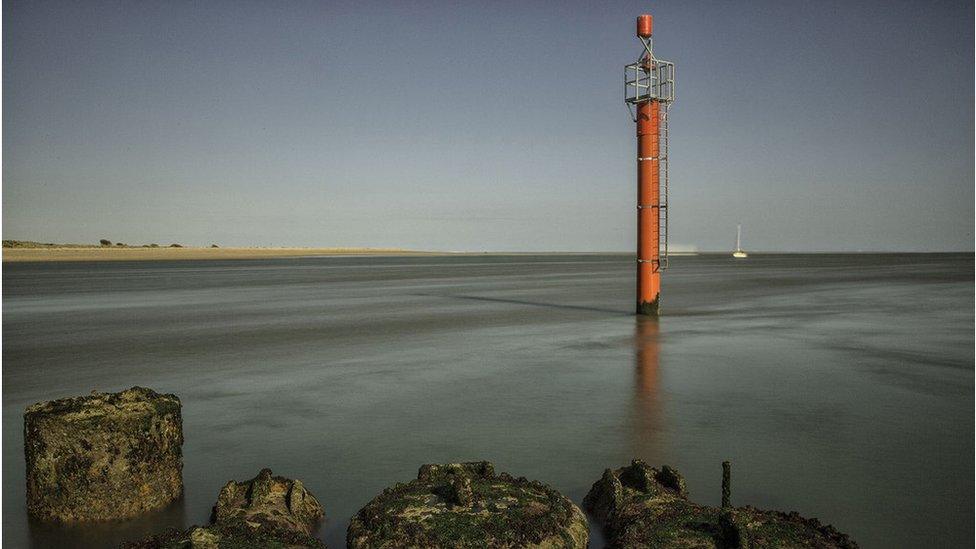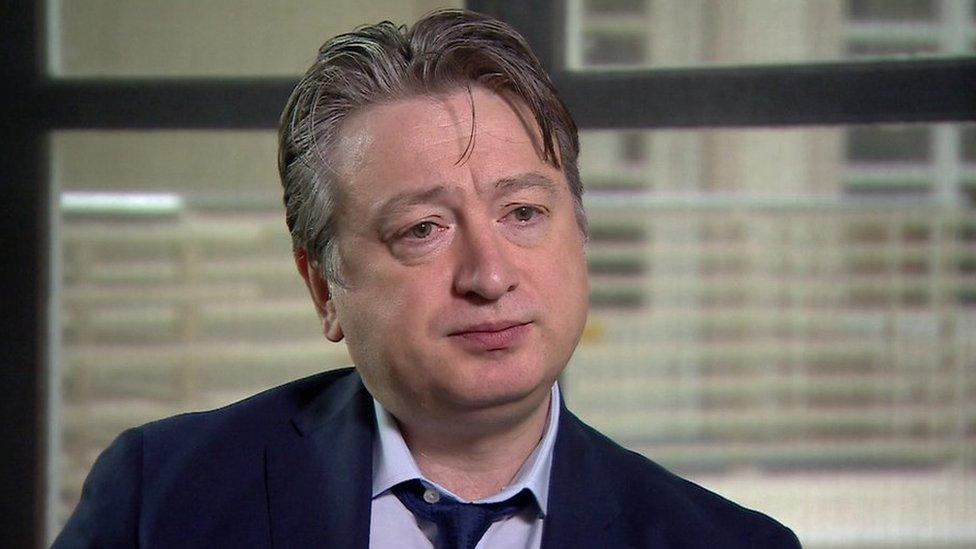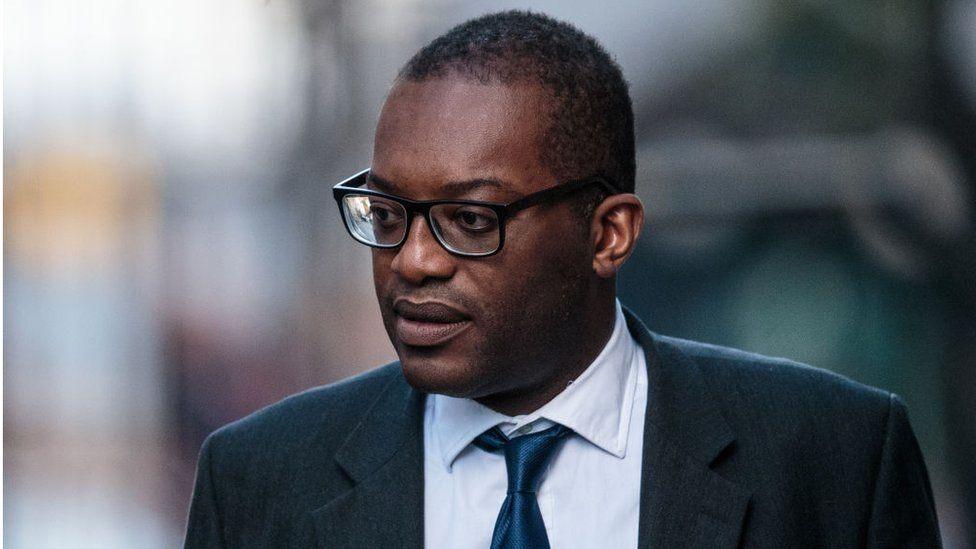Aquind: Opponents vow to continue fight against electricity link
- Published

Opposition from to the iterconnector has come from across the politcal spectrum
Opponents of a planned electricity link between England and France remain confident it will be stopped, despite a successful legal challenge against its blocking.
Aquind Ltd wants to lay cables between Portsmouth, Hampshire and Normandy.
A government decision to block the project, made in 2022, was overturned in the High Court.
Campaigners, councillors and local MPs have all said they would continue their opposition.

The interconnector, allowing electricity to flow between the two countries, would make landfall at Eastney beach in Portsmouth
The cable would make landfall at Eastney and be laid through Portsmouth and the Hampshire countryside to Lovedean.
The initial decision to reject the scheme was made by former Business Secretary Kwasi Kwarteng. It is now expected to be referred back to his successor, Grant Shapps, to make a final decision.
Commons leader and Portsmouth North MP Penny Mordaunt called the plan "flawed".
"The vast coalition of organisations that stand against this project will continue to make the case why it is so damaging and why it is unnecessary for our energy security
"It cannot happen and I'm confident that will not happen," she said.
Labour's Stephen Morgan, MP for Portsmouth South, has written to the Business Secretary to ask for a meeting.
The court decision "doesn't change the facts, and it shouldn't change the outcome," he said in the letter.
Portsmouth City Council leader Gerald Vernon Jackson said it was still "very unlikely" to go ahead, despite the legal challenge.
"Aquind have made so many enemies, it's unlikely ministers will be prepared to support it.
"Its not a bad idea, an interconnector, as France has extra electricity we could do with, but bringing it on to shore to second most densely populated city in the country and running through the city is just the wrong place to do it.
"There are much better places that would cause much less inconvenience to people - they need to think again about what they are doing," he added.
The Let's Stop Aquind group had campaigned against the interconnector. It said it would be "redoubling our opposition" and called on Grant Shapps to uphold the original decision.
It said there was "questions of credibility and trust" hanging over Aquind.
"This proposal should be stopped once and for all, lifting the threat to our precious green spaces, marine and shoreline wildlife habitats and the chaos to the city that would ensue," it said.
'Energy security'
In his January 2022 ruling, Mr Kwarteng said he was not satisfied that "more appropriate alternatives to the proposed route" for the interconnector cable had been fully considered.
But lawyers for Aquind argued in the High Court that Mr Kwarteng had "misunderstood the evidence" when making his decision.
Aquind maintains the proposed link would provide up to 5% of Great Britain's annual electricity consumption - enough to power 5m homes.
"This new link will allow electricity to flow in either direction boosting energy security and resilience against fossil fuel price and supply shocks by connecting power generation capacity in Britain and France," a statement said.
It said it would "re-engage" with local residents, stakeholders, environmental experts, and energy professionals following the court decision.

Aquind Ltd is led by Ukrainian-born British businessman Alexander Temerko
In October 2021, the BBC's Panorama programme revealed that Aquind is part-owned by Russian-born former oil executive Victor Fedotov.
The company has donated more than £700,000 to 34 Conservative MPs since the Aquind project began.
Aquind's co-owner, Ukrainian-born businessman Alexander Temerko, has donated a further £700,000 to the party.

Follow BBC South on Facebook, external, Twitter, external, or Instagram, external. Send your story ideas to south.newsonline@bbc.co.uk, external.
- Published24 January 2023

- Published21 June 2022

- Published13 July 2021
